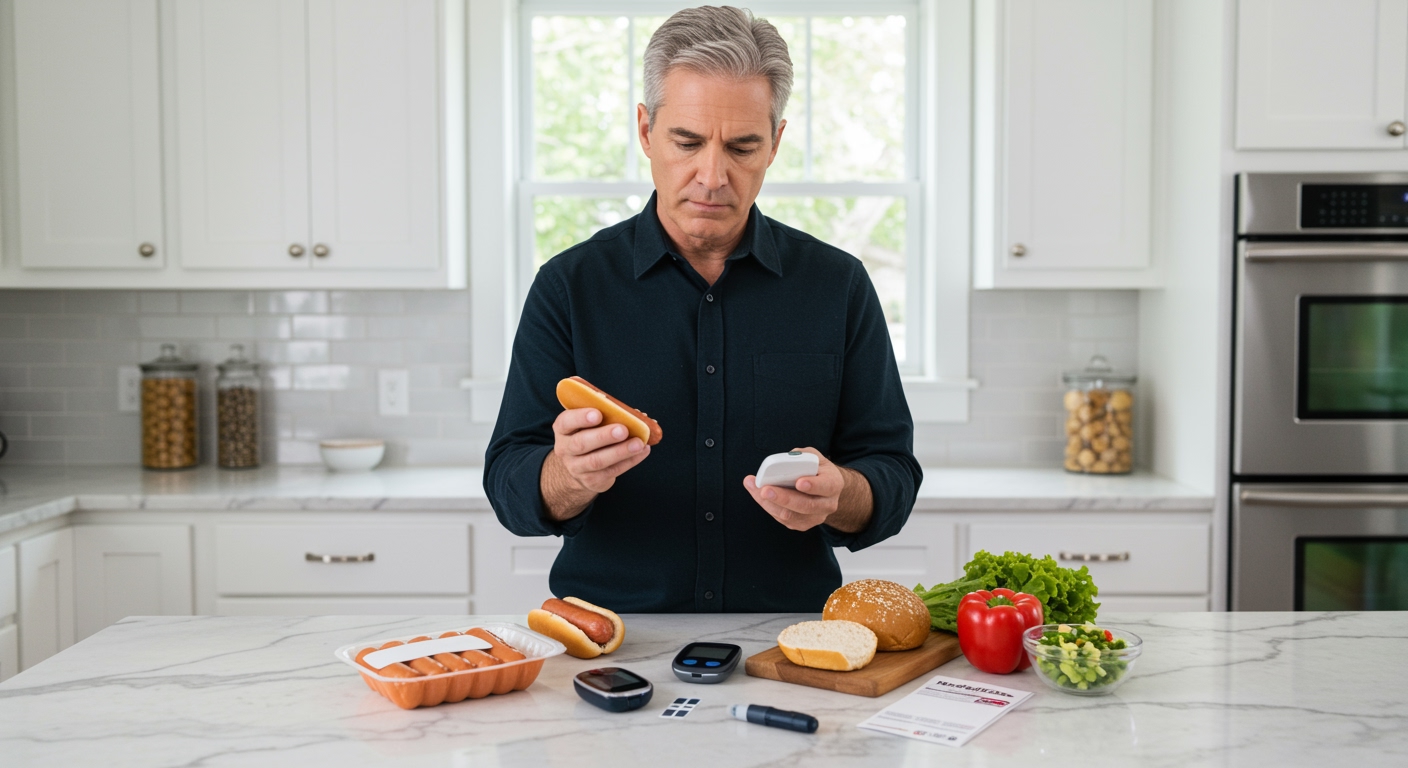✪ Key Takeaway: Hot dogs are not good for diabetes due to high sodium, nitrates, and hidden sugars that spike blood glucose levels.
Introduction
You grab a hot dog at the ballpark and wonder if this simple pleasure will send your blood sugar through the roof.
Many people with diabetes ask this question because hot dogs seem like a quick protein option that should be safe for blood sugar control.
Hi, I’m Abdur, your nutrition coach and today I’m going to explain exactly how hot dogs affect your blood sugar and why they pose serious risks for diabetes management.
What Makes Hot Dogs Dangerous For Blood Sugar?
Hot dogs contain hidden sugars that most people never consider when managing diabetes.
Manufacturers add corn syrup, dextrose, and other sweeteners during processing to enhance flavor and preserve the meat.
These added sugars can cause unexpected blood glucose spikes within 30 minutes of eating.
The sodium content in hot dogs averages 500-800 milligrams per serving, which affects insulin sensitivity over time.
High sodium intake makes your body less responsive to insulin, requiring more hormone to process the same amount of glucose.
Nitrates and nitrites used as preservatives create inflammatory compounds that interfere with normal glucose metabolism in your cells.
✪ Fact: One hot dog contains as much sodium as 3 slices of bread and hidden sugars equivalent to half a teaspoon.
How Do Processed Meats Affect Insulin Response?
Processed meats like hot dogs trigger a delayed insulin response that differs from fresh meat consumption.
The combination of preservatives, additives, and modified proteins creates compounds that your pancreas struggles to process efficiently.
Research shows that people who eat processed meats regularly have 23% higher risk of developing type 2 diabetes compared to those who avoid them.
The advanced glycation end products formed during hot dog processing bind to proteins in your blood vessels and organs.
These compounds accelerate the complications associated with diabetes, including nerve damage and kidney problems.
Your body treats processed meat differently than fresh meat because the chemical structure has been altered through industrial processing methods.
✪ Pro Tip: Fresh grilled chicken breast provides similar protein without the blood sugar complications of processed hot dogs.
What About The Bun And Condiments?
The typical hot dog bun contains refined flour that converts to glucose faster than table sugar in your bloodstream.
Most hot dog buns have a glycemic index of 85, meaning they cause rapid and significant blood sugar spikes.
Popular condiments like ketchup and sweet relish add 4-6 grams of sugar per tablespoon to your meal.
The combination of processed meat, refined bread, and sugary condiments creates a perfect storm for blood glucose elevation.
Even mustard, which seems sugar-free, often contains corn syrup or honey as the third or fourth ingredient.
The total carbohydrate load from a complete hot dog meal can reach 35-45 grams, equivalent to eating 3 slices of white bread.
✪ Note: Reading ingredient labels on condiments reveals hidden sugars that can sabotage your blood sugar control efforts.
Are There Better Alternatives For People With Diabetes?
Fresh grilled chicken sausages made without preservatives provide similar satisfaction with better blood sugar control.
Look for products with only meat, spices, and natural casings listed in the ingredients without added sugars or nitrates.
Turkey or chicken hot dogs contain fewer additives than traditional beef or pork versions, but still pose blood sugar risks.
Plant-based alternatives made from whole foods like beans and vegetables offer fiber benefits that help stabilize glucose levels.
If you choose to eat hot dogs occasionally, pair them with high-fiber vegetables and skip the bun to minimize blood sugar impact.
The key is reading labels carefully and choosing products with minimal processing and no added sugars or preservatives.
✪ Pro Tip: Wrap your protein choice in lettuce leaves instead of buns to cut carbs by 30 grams and add beneficial nutrients.
The Bottom Line
Hot dogs are not good for diabetes management due to their high sodium content, hidden sugars, and inflammatory preservatives that interfere with blood glucose control.
Your health is worth more than convenience foods that compromise your blood sugar stability and long-term wellness goals.
I would love to hear about your experiences with managing blood sugar around processed foods or any questions you have about making better protein choices in the comments below.
References
At NutritionCrown, we use quality and credible sources to ensure our content is accurate and trustworthy. Below are the sources referenced in creating this article:
- Klinio: Hot Dog and Diabetes
- The Diabetes Council: Hot Dogs and Diabetes
- Medical News Today: Just 1 Hotdog Per Day Could Harm Your Health
- Blue Circle Foundation: Hot Dog and Diabetes





